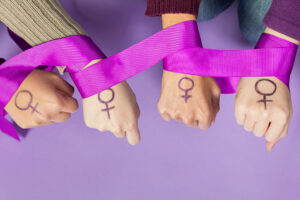It will be Women’s Month again and I cannot help but look back at our journey while promoting the brand and its ethos: great women. The meaning was a mouthful to say: Gender Responsive Economic Actions for the Transformation of Women. And that spelled an acronym: GREAT.
After Global Affairs Canada or GAC ended the three-year program with the Philippine Commission on Women (www.pcw.gov.ph) or PCW in 2012, we asked then Country Director and Chief of Party Luke Myers what they would do to the “brand” or program name. He said, “do what you want to do with it.” And so we did. He probably did not foresee that GAC would be back with a round 2 of the program which had to be called Great Women Project 2, to simplify matters and so as not to confuse stakeholders.
Jeannie Javelosa (our culture advocate friend and business partner) and I pitched it to ASEAN women’s groups and we did a roadshow in Kuala Lumpur and Hanoi to get ASEAN women on the “Great Women” bandwagon. USAID supported this journey to make the “brand” a unifying force for women entrepreneurs in the ASEAN member states, even devoting a whole conference on it in Bangkok.
It was getting traction as we did cross border trainings and learning exchanges between and among ASEAN member countries. I remember taking ASEAN women coffee farmers to Manila and letting them experience tasting their own coffee — something they had never done before. We realized that eight out of 10 ASEAN member states (with the exception of Singapore and Brunei) were coffee-producing countries. And in coffee-producing states, women play a big role. We also formed the country chapters of the International Women Coffee Alliance (www.womenincoffee.org) in Vietnam, Indonesia, and Myanmar to join our Philippine chapter established back in 2012.
A year later, we even opened a brick-and-mortar store of Great Women as a marketplace proof of concept. But as with all other brick and mortar spaces, it fell victim to the pandemic closures of stand-alone stores. Thus, the pandemic brought us to the online space. Even if the store was closed due to COVID-19 restrictions, we carried on with e-commerce and doing training online.
Today, almost 13 years later, we find that the needs of MSMEs are the same as when we started in 2012, a good decade ago and more. Financial literacy, pivoting to another business model, and, as to coffee, still tasting and trying coffees from women producers and roasters. The next generation has joined their mothers, and this makes it more sustainable as we talk to the younger women on continuing the work started by their elders.
How can we finally solve the challenges facing women in the MSME space? This is where we get help from organized business groups, like the Philippine Women’s Economic Network (www.philwen.org) and the Philippine Business Coalition for Women Empowerment (www.pbcwe.com.ph). In the coming month of March, we start with a different kind of festival — The Great Women celebration of how networking with the business community can help MSMEs. I have been asked to do a masterclass on coffee. And that will jumpstart the events on Feb. 28.
If you’re wondering how coffee can be a business from farming to retail, like coffee shops, or how to get into a coffee-related enterprise, come and join our masterclass.
Jeannie Javelosa, who is also the Yuchengco Museum’s curator, has provided a space for us to engage with women and men who want to know more about Great Women, the brand, and how it has made strides here and in the region.
I look back and reminisce about Hanoi, Bangkok, and Kuala Lumpur and even (now troubled) Myanmar where we held a briefing for Asean MSMEs some years ago. We went to Phnom Penh and Yangon to meet weavers and story tellers, and even trekked to Mandalay to meet women in coffee.
It is still a viable networking tool for us — Great Women after all must transform women economically and otherwise. And though we avoid using the term “platform,” it functions as a model for a whole ecosystem of women in the value chains of coffee, weaving, and processed food. Because you cannot help just one woman. You need to nurture a whole community of producers and sellers, and the biggest market or consumers are also women, by the way.
This Women’s Month, let’s jumpstart it by understanding how women in networks or coalitions work like a well-oiled machine. Come and attend a masterclass for coffee. Or another business idea in travel or health and wellness.
Men are the champions of diversity and inclusion because they always use the quote, “behind every successful man is a woman,” as we also submit the idea of saying “behind every successful woman is a whole group of male champions — the spouses and partners, to begin with. Next are business partners, advisors, bosses and male leaders who are ‘champions of change’.”
We ask you, dear reader, man or woman, to open your minds and hearts to what women can do when networks work together.
In the Management Association of the Philippines (MAP), we have a Diversity, Equity, and Inclusion Committee (www.map.org.ph) as we also have such a group in the Institute of Corporate Directors (www.icd.ph) and other like-minded progressive business organizations. It’s about time we also checked corporate committees or management and executive committees to ensure there is diversity of gender and expertise, among other factors, that make a better board, and management groups.
For Women’s Month, let’s give a listen to what women discuss as their challenges in the workplace so our companies can be better attuned to these nuances and address them for sound management results in whatever scorecard we use.
What can you do for Women’s month?
Chit U. Juan is the co-vice chair of the MAP Environment Committee. She is also the president of the Philippine Coffee Board, Inc. and Slow Food Manila (www.slowfood.com).
map@map.org.ph
pujuan29@gmail.com

